-
GOP lawmakers advise defense contractors to issue sequestration-related layoff notices
The Worker Adjustment and Retraining Notification Act requires that an employer who employs more than 100 employees must provide a 60-day advanced notice to employees of mass layoffs or the closing of a plant; if the act is not followed, employees can sue for back pay and benefits for up to sixty days; the Obama administration advised defense contractors that they should not comply with the act, even in the face of the 2 January 2013 $500 billion cut in the defense budget which would go into effect if no deficit reduction agreement is reached; if contracts are cancelled and mass lay-offs ensue, the administration said it would cover the defense contractors’ non-compliance-related legal costs; Republican lawmakers say they would block any payments to cover such non-compliance, and advised defense contractors that they should follow the law
-
-
U.S. Navy tests the second of two railgun prototypes

The EM Railgun launcher is a long-range naval weapon that fires projectiles using electricity instead of traditional gun propellants such as explosive chemicals; magnetic fields created by high electrical currents accelerate a sliding metal conductor, or armature, between two rails to launch projectiles at 4,500-5,600 mph; the Office of Naval Research’s Electromagnetic (EM) Railgun program is evaluating the second of two industry railgun prototype launchers at a facility in Dahlgren, Virginia
-
-
Green laser pointer identifies traces of dangerous chemicals in real time
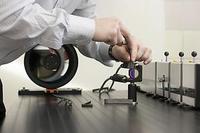
By using an ordinary green laser pointer, the kind commonly found in offices and college lecture halls, an Israeli research team has developed a new and portable Raman spectrometer which can detect minute traces of hazardous chemicals in real time; the new sensor’s compact design makes it a candidate for rapid field deployment to disaster zones and areas with security concerns
-
-
New launch and recovery system for the Scan Eagle UAV
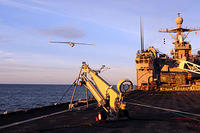
A shipboard-capable system designed to support both the launch and recovery of the Scan Eagle UAV successfully completed final demonstration flight testing on 27 September at a testing range in eastern Oregon
-
-
Defense firms growing anxious about sequestration-related defense cuts
Defense contractors are growing anxious as they still do not know whether $500 billion in defense cuts will take place on 1 January 2013 as a result of sequestration; many firms are hoping that the administration and Congress will come to a budget agreement once the election is over, but at the same time, it is something contractors cannot rely on; what complicates the issue is the Worker Adjustment and Retraining Notification Act (WARN), which requires employers with more than 100 employees to give employees a 60-day notice before mass lay-offs or plant closure
-
-
Fueling UAVs in flight
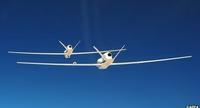
DARPA completes close-proximity flight tests of two modified RQ-4 Global Hawk unmanned aerial vehicles, demonstrating technology enabling autonomous aerial refueling
-
-
Hezbollah drone shot down over Israel
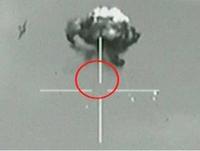
The Israel Air Force (IAF) planes shot down a UAV over the north Negev; the UAV entered Israeli air space from the west, but Israeli intelligence says the drone was launched by Hezbollah in Lebanon, then made its way south over the Mediterranean, then turned east when it reached the water off the Gaza Strip
-
-
Jewish Community Homeland Security Primer distributed to law enforcement agencies
Amidst the Jewish High Holidays, the Secure Community Network (SCN), the national homeland security initiative of the Jewish Federations of North America and the Conference of Presidents, distributed what SCN described as “a first ever” homeland security briefing primer for American law enforcement and homeland security agencies and national security partners across the United States
-
-
Oshkosh Defense unveils new light vehicle for unconventional missions
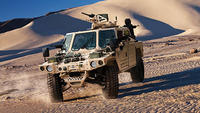
Using the occasion of the Modern Day Marine 2012 exposition, held 25-27 September in Quantico, Virginia, Oshkosh Defense unveiled its new Special Purpose All-Terrain Vehicle (S-ATV) designed for unconventional and reconnaissance missions, and also showed its Light Combat Tactical All-Terrain Vehicle (L-ATV), which was selected for the Joint Light Tactical Vehicle (JLTV) Engineering, Manufacturing and Development (EMD) phase; the joint services are expected to replace tens of thousands of HMMWVs with the JLTV
-
-
U.K. military’s drone spending keep rising
In an effort to boost its military, the United Kingdom, over the past five years, has spent more than two billion euros buying and developing unmanned drones; the U.K. has no intention of slowing down, as it is committed to spending another two billion euros on new unmanned aircraft
-
-
Motorola Solutions invests in SST, provider of ShotSpotter gunfire location and analysis technology
Motorola Solutions Venture Capital joins major existing investors in a $12 million new investment round in SST, Inc., developer of the ShotSpotter acoustic gunfire location and analysis system; the strategic investment aims to help expand the usage of ShotSpotter by law enforcement agencies throughout the United States and globally in advancing next-generation 911 (NG911) capabilities and initiatives
-
-
Imagining first responders’ high-tech future
What kinds of gear will be needed by future firefighters, EMTs, and police officers? DHS Science and Technology Directorate researchers asked the experts, then applied sophisticated math to discover unlikely patterns
-
-
New mobile app could save lives in earthquakes
A new iPhone app called has been developed to locate loved ones in the world’s earthquake zones during the event of an earthquake; the app, once downloaded, prompts users to enter their own details and those of four friends or family members in order to become their “Buddies”; in the event of an earthquake registering above 5.5, the user’s buddies will instantaneously receive an e-mail displaying a Google map of the user’s location
-
-
EU considers far-reaching Internet security initiative
Cybersecurity is becoming an increasingly more daunting challenge as governments try to prevent attacks against critical infrastructure on which the well-being of countries depends, now, several European countries are trying to come together in an effort to defend themselves against a cyber attack, but critics say the project, called CleanIT, goes too far
-
-
Speed camera detectors gaining popularity in Europe
There are 25,000 speed cameras in Europe, and the governments of European countries publicize the cameras’ locations; still, million so Europeans install speed camera detectors in their smartphone; such speed camera detectors are legal in all European countries except Germany and Switzerland, which does not stop hundreds of thousands of Germans from using them
-
More headlines
The long view
Why Ukraine’s AI Drones Aren’t a Breakthrough Yet
Machine vision, a form of AI, allows drones to identify and strike targets autonomously. The drones can’t be jammed, and they don’t need continuous monitoring by operators. Despite early hopes, the technology has not yet become a game-changing feature of Ukraine’s battlefield drones. But its time will come.
